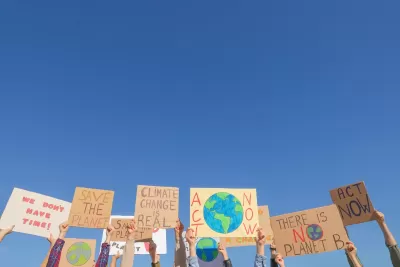A recent study found that the terms “climate change” and “global warming” are more familiar and generate greater public concern than less recognized terms like “climate crisis” and “climate justice.”

A University of Southern California (USC) study published in Climatic Change reveals that the terms “climate change” and “global warming” are more familiar to the public and generate greater concern than less recognized terms like “climate crisis,” “climate emergency,” and “climate justice.” The study found that almost 90 percent of respondents were familiar with “climate change” and “global warming,” while only 33 percent recognized “climate justice.” This familiarity significantly influences how people perceive and respond to environmental issues.
The research also explored the connection between terminology and public willingness to support climate-friendly policies and lifestyle changes, such as reducing red meat consumption. Although overall support for climate action was consistent across different terms, the study noted that familiarity with terms like “climate change” increased the urgency felt by respondents. Political affiliation played a significant role in shaping responses, with Democrats and Independents expressing more concern and willingness to act than Republicans.
A notable finding of the study was the polarization of the term “climate justice,” which was recognized and supported by a higher percentage of Democrats compared to Republicans. The researchers suggest that the political connotations and lesser-known nature of the term contribute to its lower resonance among the general public. The study emphasizes the importance of using familiar terminology when communicating about climate issues to ensure broader public engagement and concern.
The study was conducted with 5,137 U.S. residents and included contributions from scholars at various USC schools. It highlights the critical role of language in shaping public attitudes toward climate change and underscores the need for strategic communication in advancing climate policy and action.
FULL STORY: Study: Just Say “Climate Change” – not “Climate Emergency”

Alabama: Trump Terminates Settlements for Black Communities Harmed By Raw Sewage
Trump deemed the landmark civil rights agreement “illegal DEI and environmental justice policy.”

Planetizen Federal Action Tracker
A weekly monitor of how Trump’s orders and actions are impacting planners and planning in America.

The 120 Year Old Tiny Home Villages That Sheltered San Francisco’s Earthquake Refugees
More than a century ago, San Francisco mobilized to house thousands of residents displaced by the 1906 earthquake. Could their strategy offer a model for the present?

In Both Crashes and Crime, Public Transportation is Far Safer than Driving
Contrary to popular assumptions, public transportation has far lower crash and crime rates than automobile travel. For safer communities, improve and encourage transit travel.

Report: Zoning Reforms Should Complement Nashville’s Ambitious Transit Plan
Without reform, restrictive zoning codes will limit the impact of the city’s planned transit expansion and could exclude some of the residents who depend on transit the most.

Judge Orders Release of Frozen IRA, IIJA Funding
The decision is a victory for environmental groups who charged that freezing funds for critical infrastructure and disaster response programs caused “real and irreparable harm” to communities.
Urban Design for Planners 1: Software Tools
This six-course series explores essential urban design concepts using open source software and equips planners with the tools they need to participate fully in the urban design process.
Planning for Universal Design
Learn the tools for implementing Universal Design in planning regulations.
Clanton & Associates, Inc.
Jessamine County Fiscal Court
Institute for Housing and Urban Development Studies (IHS)
City of Grandview
Harvard GSD Executive Education
Toledo-Lucas County Plan Commissions
Salt Lake City
NYU Wagner Graduate School of Public Service





























